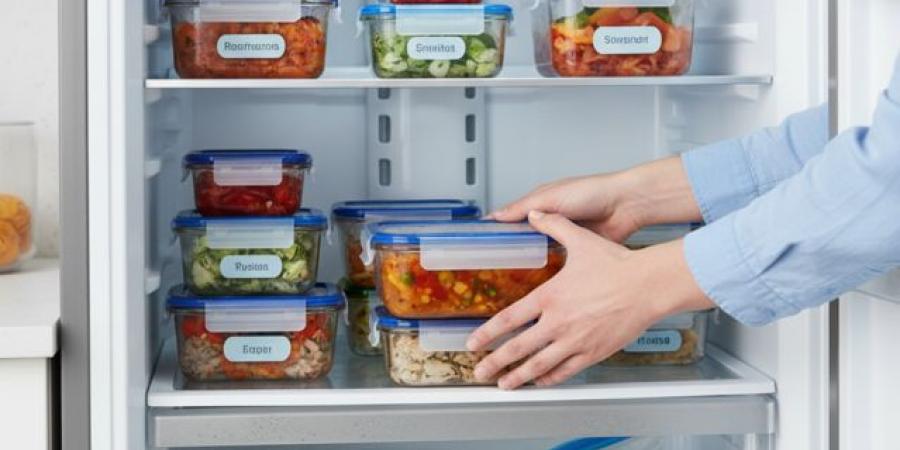نعرض لكم زوارنا أهم وأحدث الأخبار فى المقال الاتي:
7 Foods That Should Never Touch Your Fridge - المصدر 7, اليوم الاثنين 10 نوفمبر 2025 01:27 مساءً
المصدر 7 - You probably think keeping everything cold keeps it fresh — but that’s not always true.
While your fridge protects most foods from spoilage, some ingredients actually lose their flavor, texture, and nutrients when stored in the cold.
Refrigeration slows down bacterial growth, but for certain foods, it does more harm than good. Cold temperatures can dull flavors, ruin textures, or speed up decay in unexpected ways.
Here are seven foods you should never keep in the fridge, and why keeping them at room temperature actually keeps them fresher, tastier, and longer-lasting.
1. Tomatoes — Say Goodbye to Flavor in the Fridge
Tomatoes are one of the biggest victims of refrigeration.
Why they don’t belong there:
Cold temperatures break down the delicate cell membranes inside tomatoes, making them mushy and flavorless.
Science says:
According to the Proceedings of the National Academy of Sciences, chilling tomatoes below 54°F (12°C) stops the enzymes that produce their natural aroma and sweetness.
Best way to store:
Keep tomatoes at room temperature, away from direct sunlight, with the stem side down to prevent moisture loss.
Pro tip:
If they start to overripe, make tomato sauce — it tastes better than ever.
2. Potatoes — Cold Turns Their Starch Into Sugar
You might think the fridge keeps potatoes from sprouting, but it actually causes a bigger problem.
Why they don’t belong there:
When potatoes get too cold, their starch converts into sugar. The result? An odd, sweet flavor and gritty texture once cooked.
Science says:
The U.S. Department of Agriculture warns that chilled potatoes can also produce acrylamide, a potentially harmful compound, when fried or baked.
Best way to store:
Store them in a cool, dark, and well-ventilated place — like a pantry or paper bag, not plastic.
Pro tip:
Avoid storing near onions — they release gases that make each other spoil faster.
3. Onions — Moisture Ruins Their Crunch
Onions and cold don’t mix.
Why they don’t belong there:
The humidity inside a fridge causes onions to become soft, moldy, and soggy.
Science says:
Cold environments accelerate moisture absorption and rot, especially for unpeeled onions.
Best way to store:
Keep them in a mesh bag or open basket in a dry, airy place.
Pro tip:
Once peeled or chopped, store onions in an airtight container in the fridge — but use them within a few days.
4. Bread — The Fastest Way to Make It Go Stale
If you’ve ever wondered why your bread turns dry and crumbly in the fridge, here’s the reason.
Why it doesn’t belong there:
Refrigeration causes retrogradation, where starch molecules crystallize and draw out moisture.
Science says:
Bread can go stale up to six times faster in the fridge than at room temperature, according to food scientists.
Best way to store:
Keep bread in a bread box or tightly sealed bag at room temperature.
For long-term storage, freeze it instead of refrigerating.
Pro tip:
Toast frozen bread straight from the freezer — it tastes freshly baked.
5. Honey — Cold Destroys Its Natural Magic
Honey is one of the few foods that never spoils — unless you refrigerate it.
Why it doesn’t belong there:
Cold temperatures cause crystallization, making honey thick and grainy.
Science says:
Honey contains natural enzymes that resist bacteria, which means it’s self-preserving and doesn’t need chilling.
Best way to store:
Keep it tightly sealed in a dark cupboard at room temperature.
Pro tip:
If it crystallizes, place the jar in warm (not hot) water for a few minutes to restore its liquid texture.
6. Garlic — Fridge Humidity Makes It Spoil Faster
It may seem logical to store garlic in the fridge, but it actually speeds up spoilage.
Why it doesn’t belong there:
Cold and humidity cause garlic bulbs to sprout or grow mold.
It also loses its sharp, aromatic flavor over time.
Science says:
The Institute of Food Technologists recommends keeping garlic in dry, ventilated containers instead of cold, sealed spaces.
Best way to store:
Store whole bulbs in a mesh bag or basket at room temperature.
Pro tip:
Once peeled, store cloves in olive oil in the fridge — but use within a week to avoid bacterial growth.
7. Coffee — Fridge Ruins Its Aroma
If you’re keeping coffee beans or grounds in the fridge to “preserve freshness,” think again.
Why it doesn’t belong there:
Coffee is hygroscopic — it absorbs moisture and odors from its surroundings.
In the fridge, it quickly loses its aroma and can even taste like other foods.
Science says:
Coffee’s natural oils break down faster in fluctuating temperatures, leading to a flat, bitter taste.
Best way to store:
Keep coffee in an airtight, opaque container in a cool, dark place.
Pro tip:
If you buy in bulk, freeze small portions and thaw only what you need.







0 تعليق